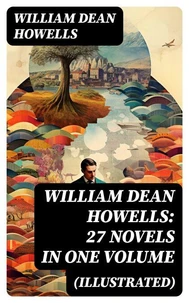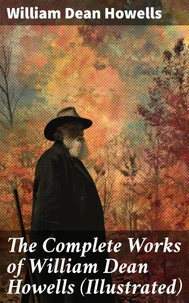Italian Journeys. A Journey Through Italy: Culture, Beauty, and Reflection
Par :Formats :
Disponible dans votre compte client Decitre ou Furet du Nord dès validation de votre commande. Le format ePub est :
- Compatible avec une lecture sur My Vivlio (smartphone, tablette, ordinateur)
- Compatible avec une lecture sur liseuses Vivlio
- Pour les liseuses autres que Vivlio, vous devez utiliser le logiciel Adobe Digital Edition. Non compatible avec la lecture sur les liseuses Kindle, Remarkable et Sony
 , qui est-ce ?
, qui est-ce ?Notre partenaire de plateforme de lecture numérique où vous retrouverez l'ensemble de vos ebooks gratuitement
Pour en savoir plus sur nos ebooks, consultez notre aide en ligne ici
- Nombre de pages310
- FormatePub
- ISBN4057664570444
- EAN4057664570444
- Date de parution05/12/2019
- Protection num.Digital Watermarking
- Taille769 Ko
- Infos supplémentairesepub
- ÉditeurGOOD PRESS
Résumé
In "Italian Journeys, " William Dean Howells crafts a vivid tapestry of his travels through Italy, blending personal narrative with astute observations on Italian culture, society, and art. Written in the late 19th century, Howells'Äô literary style reflects the Realist movement, characterized by its emphasis on everyday experiences and the portrayal of life without embellishment. His descriptive prose captures the essence of each location, introducing readers to the stunning landscapes and rich historical contexts of Italy, while also engaging in social critique on class and tourism, making it an essential text for understanding the intersection of travel and literary exploration during this period.
William Dean Howells, a notable American author and literary critic, was deeply influenced by his own experiences and the burgeoning interest in European cultures among American intellectuals of his time. His diplomatic background and relationships with prominent figures of the period, including Mark Twain and Henry James, informed his worldview and literary pursuits. Through "Italian Journeys, " Howells reflects not only his personal impressions but also the broader social dynamics at play in the post-Risorgimento Italy, lending the narrative a historical depth that enriches its travelogue appeal.
This book is indispensable for readers who seek to delve into the subtleties of Italian culture through the eyes of a perceptive observer. Howells'Äô travelogue is not merely a recounting of places visited but a profound exploration of the human experience, and it invites both the casual traveler and the astute scholar to reconsider their understanding of Italy's multifaceted identity.
William Dean Howells, a notable American author and literary critic, was deeply influenced by his own experiences and the burgeoning interest in European cultures among American intellectuals of his time. His diplomatic background and relationships with prominent figures of the period, including Mark Twain and Henry James, informed his worldview and literary pursuits. Through "Italian Journeys, " Howells reflects not only his personal impressions but also the broader social dynamics at play in the post-Risorgimento Italy, lending the narrative a historical depth that enriches its travelogue appeal.
This book is indispensable for readers who seek to delve into the subtleties of Italian culture through the eyes of a perceptive observer. Howells'Äô travelogue is not merely a recounting of places visited but a profound exploration of the human experience, and it invites both the casual traveler and the astute scholar to reconsider their understanding of Italy's multifaceted identity.
In "Italian Journeys, " William Dean Howells crafts a vivid tapestry of his travels through Italy, blending personal narrative with astute observations on Italian culture, society, and art. Written in the late 19th century, Howells'Äô literary style reflects the Realist movement, characterized by its emphasis on everyday experiences and the portrayal of life without embellishment. His descriptive prose captures the essence of each location, introducing readers to the stunning landscapes and rich historical contexts of Italy, while also engaging in social critique on class and tourism, making it an essential text for understanding the intersection of travel and literary exploration during this period.
William Dean Howells, a notable American author and literary critic, was deeply influenced by his own experiences and the burgeoning interest in European cultures among American intellectuals of his time. His diplomatic background and relationships with prominent figures of the period, including Mark Twain and Henry James, informed his worldview and literary pursuits. Through "Italian Journeys, " Howells reflects not only his personal impressions but also the broader social dynamics at play in the post-Risorgimento Italy, lending the narrative a historical depth that enriches its travelogue appeal.
This book is indispensable for readers who seek to delve into the subtleties of Italian culture through the eyes of a perceptive observer. Howells'Äô travelogue is not merely a recounting of places visited but a profound exploration of the human experience, and it invites both the casual traveler and the astute scholar to reconsider their understanding of Italy's multifaceted identity.
William Dean Howells, a notable American author and literary critic, was deeply influenced by his own experiences and the burgeoning interest in European cultures among American intellectuals of his time. His diplomatic background and relationships with prominent figures of the period, including Mark Twain and Henry James, informed his worldview and literary pursuits. Through "Italian Journeys, " Howells reflects not only his personal impressions but also the broader social dynamics at play in the post-Risorgimento Italy, lending the narrative a historical depth that enriches its travelogue appeal.
This book is indispensable for readers who seek to delve into the subtleties of Italian culture through the eyes of a perceptive observer. Howells'Äô travelogue is not merely a recounting of places visited but a profound exploration of the human experience, and it invites both the casual traveler and the astute scholar to reconsider their understanding of Italy's multifaceted identity.





